
Opinion
14:59, 17-Jan-2019
Opinion: The World Bank should not be a proxy for China-U.S. competition
Updated
09:22, 26-Jan-2019
Zhao Minghao
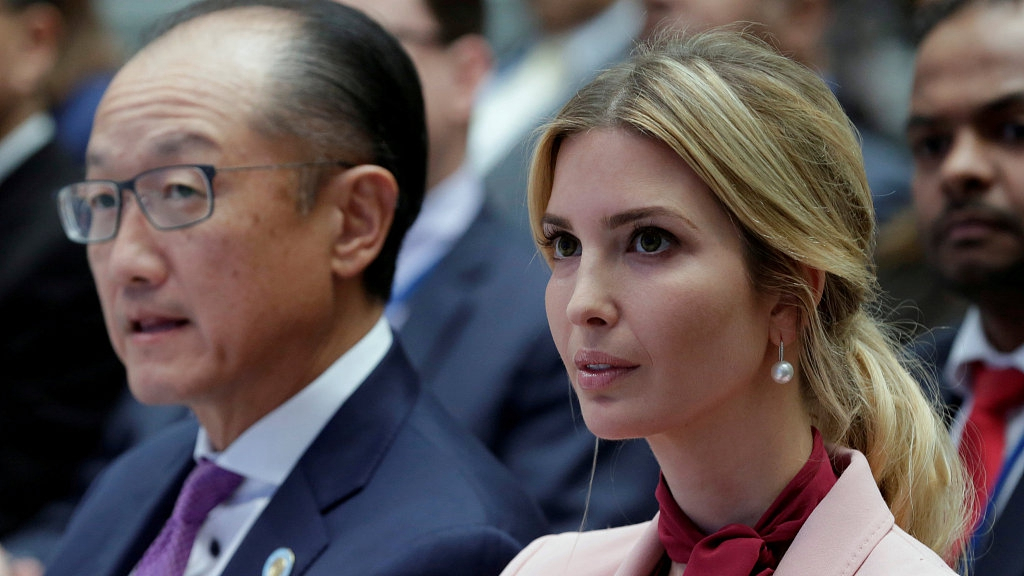
Editor's note: Zhao Minghao is a senior research fellow with the Charhar Institute and an adjunct fellow at the Chongyang Institute for Financial Studies under Renmin University of China. The article reflects the author's opinion, and not necessarily the views of CGTN.
Who will succeed the abruptly resigned Jim Yong Kim as the next president of the World Bank has drawn much attention from the international community. The White House has recently denied that President Trump's daughter Ivanka is a candidate for the post. Ivanka has been only assisting U.S. Treasury Secretary Mnuchin and White House Acting Chief of Staff Mulvaney in the selection of candidates for the World Bank president.
The World Bank currently has 189 member states. The United States is its largest shareholder and has 16 percent of the voting rights, which allows it to exercise veto power when it deems necessary.
In 2012, facing pressure to allow people from emerging economies to compete for the presidency, the Obama administration eventually put Jim Yong Kim in the position. Now, in any case, it seems that Kim's successor, the next president of the World Bank, is most likely to be another American.
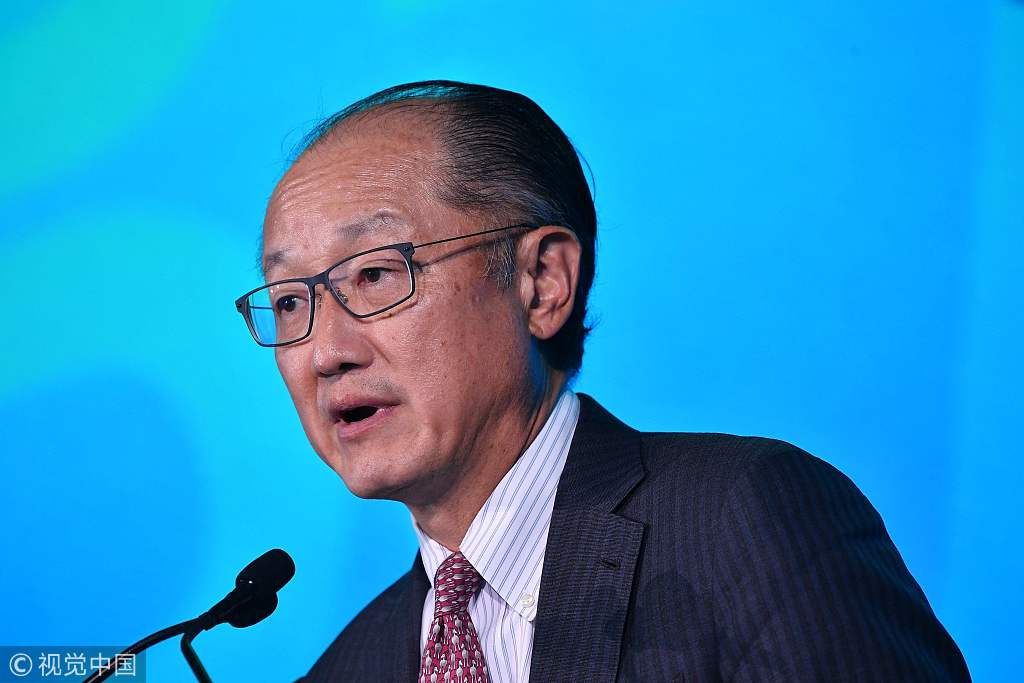
Outgoing World Bank President Jim Yong Kim speaks during the One Planet Summit in New York City, U.S., September 26, 2018./ VCG Photo
Outgoing World Bank President Jim Yong Kim speaks during the One Planet Summit in New York City, U.S., September 26, 2018./ VCG Photo
The Trump administration has been trying to consolidate the U.S. leadership in selective multilateral institutions, while simply withdrawing from international mechanisms that it believes are useless for achieving the “America First” policy.
In December 2018, U.S. Secretary of State Mike Pompeo declared in Brussels that the United States is reshaping the international system after World War II to establish a “new liberal order,” which includes promoting the reform of the World Bank.
The Trump administration opposes World Bank's support for projects related to climate change, but the World Bank regards improving developing countries' capacity to cope with climate change as an important task, for instance, promoting the use of clean electricity in Vietnam, Brazil and other countries.
In contrast, Trump has always questioned the very existence of climate change. The United States has withdrawn from the Paris agreement and cut its contribution to the “Green Climate Fund.”
The fund was established in 2010 to promote projects that help reduce greenhouse gas emissions. The Obama administration promised to contribute 3 billion U.S. dollars in November 2014, but Trump decided to “terminate” U.S. contributions to the fund in June 2017.
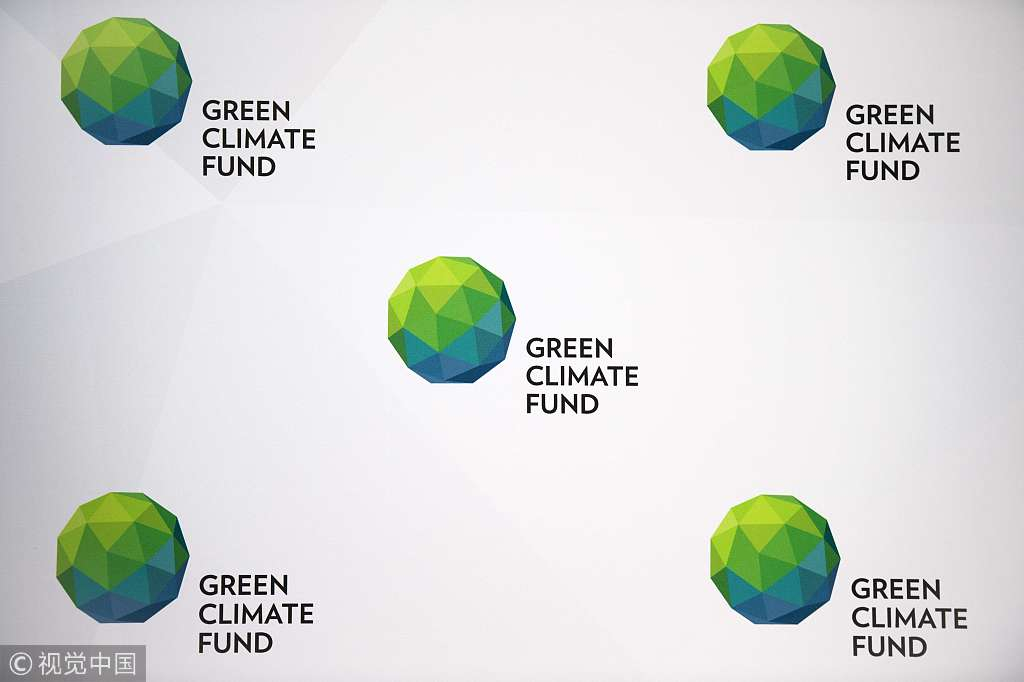
The logo of the Green Climate Fund is seen multiple times on the wall at a conference venue in Berlin, Germany, November 20, 2014./ VCG Photo
The logo of the Green Climate Fund is seen multiple times on the wall at a conference venue in Berlin, Germany, November 20, 2014./ VCG Photo
In October 2018, the “Global Commission on Adaptation” was set up by people such as former UN Secretary-General Ban Ki-moon and Bill Gates, and was launched in the Hague. The commission's goal is to stop the reversal of global efforts in dealing with climate change – World Bank CEO Georgieva is one of the members of the commission.
In fact, in order to get the support of the Trump administration, Jim Yong Kim once supported the establishment of the “Women Entrepreneurs Fund” and Donald Trump's daughter Ivanka Trump is in charge of the project. Even so, Jim Yong Kim and the World Bank under his leadership are still viciously criticized by the Trump administration, and many of these criticisms are related to China.
In order to strengthen its ability to invest and finance development projects worldwide, the World Bank had hoped to push forward a capital increase in 2017, but the U.S. Treasury blocked it. The Under Secretary of the Treasury for International Affairs David Malpass said the World Bank needs major reforms, especially in reducing or even canceling loans to middle-income countries.
According to the U.S. side, it is unacceptable for China to obtain a large number of loans from the International Bank for Reconstruction and Development under the framework of the World Bank. The Trump administration has positioned China as its primary strategic competitor.
In response, Jim Yong Kim has argued that the benefit of lending to China is two-fold. First, it can increase the World Bank's influence on China's domestic reforms. Second, the World Bank's experience in China is helpful to the Bank's work in other developing countries, especially in areas like poverty alleviation.
What makes the Trump administration even more dissatisfied is that the World Bank has been very supportive of China's Belt and Road Initiative. Like many other leaders of international organizations, Jim Yong Kim attended the Belt and Road Forum for International Cooperation held in Beijing in May 2017.
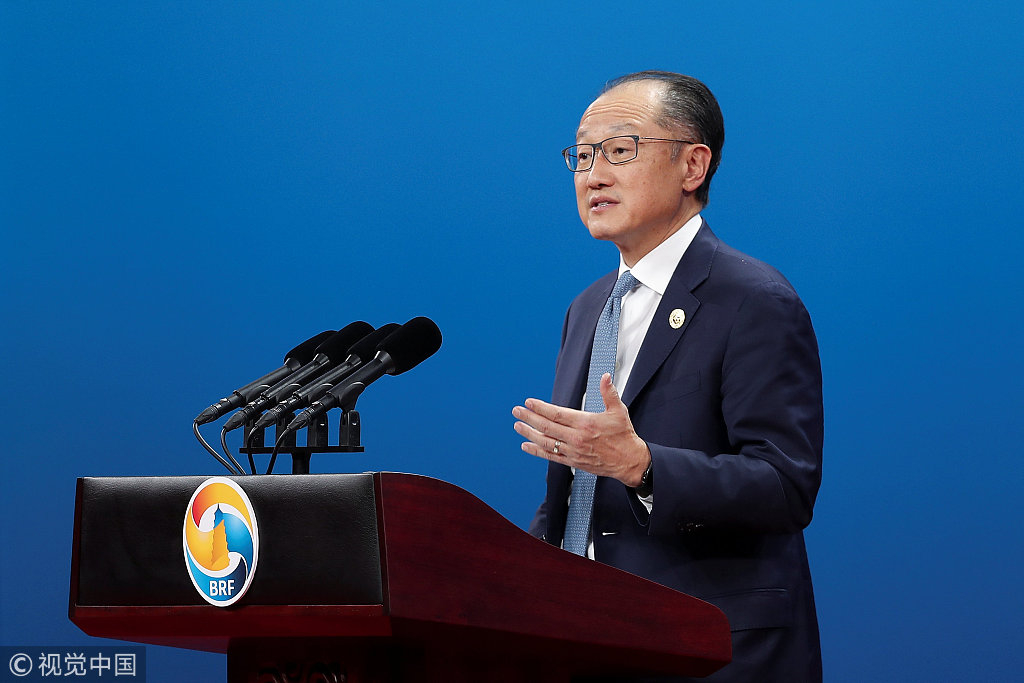
World Bank Group President Jim Yong Kim delivers his speech during the Belt and Road Forum for International Cooperation in Beijing, China, May 14, 2017. /VCG Photo
World Bank Group President Jim Yong Kim delivers his speech during the Belt and Road Forum for International Cooperation in Beijing, China, May 14, 2017. /VCG Photo
In addition, the World Bank has also worked closely with the Asian Infrastructure Investment Bank initiated by China to provide joint financing for infrastructure projects in Pakistan and other countries.
This does not mean that the World Bank is a pro-China organization. As Scott Morris, a senior fellow at the U.S.-based think tank Center for Global Development, said, the World Bank is merely trying to reduce the impact of the AIIB through increased contact with China. Considering China's increasing influence in international development, the World Bank's “contact” strategy is actually wise. The AIIB, which was officially launched in 2016, has received AAA ratings from international rating agencies such as Moody's, signaling recognition of the institution's compliance with international rules.
But the problem is that the United States is increasingly looking at China's role in international development from a zero-sum perspective. Republican Senator Todd Young who's a member of U.S. Senate Committee on Foreign Relations claimed that the United States must maintain its leadership in multilateral economic institutions such as the World Bank, or China will take advantage of the leadership vacuum to distort the mission and values of these institutions.
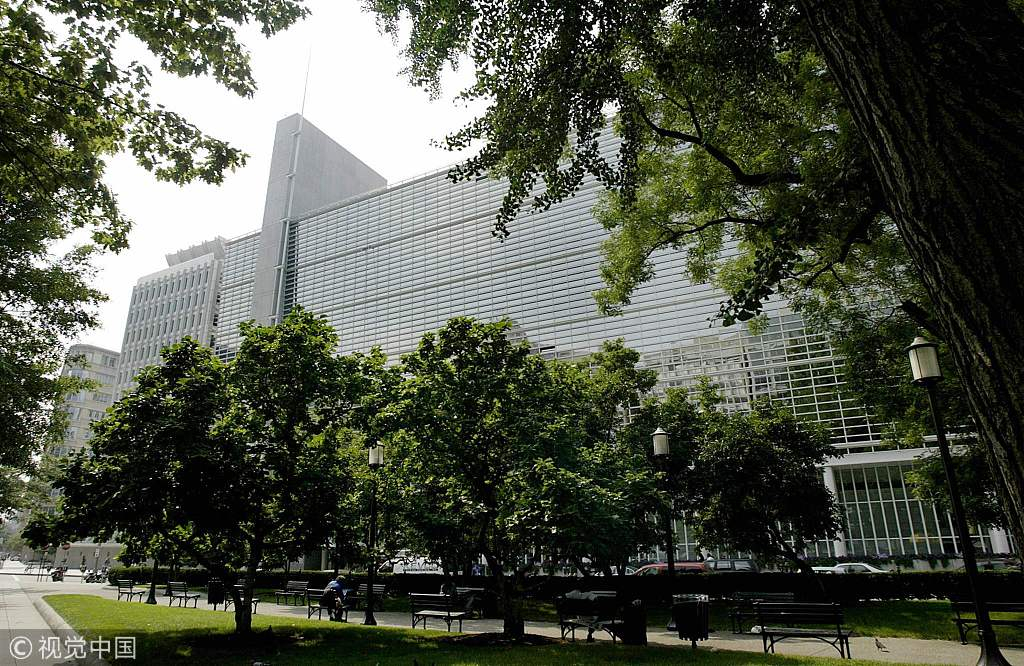
The World Bank building in Washington, D.C., U.S., August 8, 2003./ VCG Photo
The World Bank building in Washington, D.C., U.S., August 8, 2003./ VCG Photo
However, China currently is not in a leadership position in the World Bank. As the world's second largest economy, China has only 4.45 percent of the total voting power in the Bank.
In fact, international development is facing severe challenges, requiring more cooperation rather than competition between the U.S. and China. For example, 600 million people in Africa still live without electricity supply, and the “Power Africa” initiative put forward by the Obama administration has basically stagnated.
According to a study conducted by the Global Development Policy Center of Boston University, since 2000, China has provided 34.8 billion U.S. dollars in financing energy projects in Africa, including power stations and power grids. Chinese enterprises in Africa can buy a large amount of equipment and technology from General Electric, a U.S. company.
In a nutshell, no matter who the next president of the World Bank will be, such an international multilateral mechanism should not be reduced to a proxy for competition between major powers. There are indeed some differences between Trump's “America First” strategy and collaborative values and spirit that the World Bank ought to uphold.
(Cover photo: World Bank President Jim Yong Kim and Ivanka Trump attend an event on women's entrepreneurship during the IMF/World Bank annual meetings in Washington, D.C., U.S., October 14, 2017./ VCG Photo)
(If you want to contribute and have specific expertise, please contact us at opinions@cgtn)

SITEMAP
Copyright © 2018 CGTN. Beijing ICP prepared NO.16065310-3
Copyright © 2018 CGTN. Beijing ICP prepared NO.16065310-3